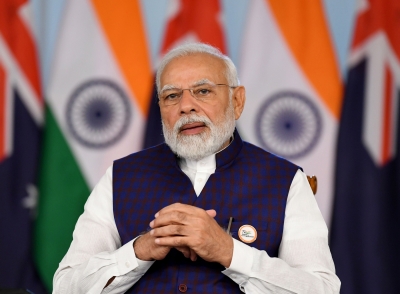By Vishnu MakhijaniNew Delhi, April 10 : Prime Minister Narendra Modi has often iterated that Indians have dared to dream that the 21st century will belong to India and the manner in which the country has tackled the Covid-19 pandemic shows that this dream “may truly become a reality”, says a new book that charts the manner in which the crisis was met head-on.
“The prime minister often says that Indians have dared to dream, ‘ekkeesvi sadi Bharat ki hi hogi’ (that the 21st century will belong to India.With the path we are on now, this dream may truly become a reality that forthcoming generations and perhaps even ours may be able to experience,” Priyam Gandhi-Mody, a strategist specialising in political communication, writes in ‘A Nation to Protect – Leading India Through The Covid Crisis’ (Rupa), the first definitive and comprehensive account of India’s response to the pandemic from the top echelons of leadership and government, to healthcare workers, the armed forces and the citizens at large.
As the pandemic progressed, Indians united and fought the virus with great tenacity in the face of profound adversity, she writes.
“With timely lockdowns, disciplined mask usage, quick medical infrastructure upgrades, widespread adaptation of digital technologies, science-based regulations and vaccine adoption, we emerged with much lesser damage than many, large developed nations of the world.Hovering at an average of 1.11 per cent through the pandemic, India’s fatality has been the lowest in the world, leaving sceptics astounded.
“Despite totally shutting down our economy for a limited period of time during the initial days of the pandemic, India has managed to get it back on track with sound, strategic regulatory responses.We have also been the quickest country to administer over 1.6 billion vaccine doses in a matter of less than a year flabbergasting critics who predicted that India would take at least a decade to vaccinate its entire population,” Gandhi-Mody writes.
Contending that we are now in the age of a New India, “which is stronger, unflinching in its resolve to grow and undeterred by crises.We are no longer discovering our place in the world, but are confident in our contribution towards humanity and the globe”, the book states.
This vision, the author contends was ushered in by Modi from the time he took office in 2014.
“In simple words, it wouldn’t be an overture to say the reason for India’s response to Covid-19 was appropriate, adequate and largely effective was because of the culmination of initiatives that the prime minister introduced from the beginning of his first term up until the pandemic.The bureaucracy and the citizens responded enthusiastically to his every call.Each time he showed vulnerability, seeking help from society and officers, citizens rose to the challenge and outperformed to meet his expectations,” the author writes.
How did Modi do it?
“Ever since I took office, it has been my resolve to identify and fix the weaknesses in the way the Indian government functions, the Prime Minister told the author during a “short tete-a-tete”.
Citing an example, he said the “biggest weakness of the Indian bureaucracy is that it is an assembled unit, not an organic unit.
What this means is that our officers come from various parts of the country, spend years in service in various states, get promoted and finally make it to senior levels of leadership in department at the Centre.How this plays out is that coordination and camaraderie between officers at senior levels in various departments, doesn’t come naturally”.
“So, when I took office very early on, I realised I needed to change the culture of bureaucracy to make it life-sensitive versus file-sensitive, which had been the case since our Independence.I proactively took several initiatives to form small groups of senior officers, assign them common goals to work on and spent a lot of time with them.
Eventually, the officers began to understand what my expectations were from them and began to respond to my calls more efficiently as a unit,” the Prime Minister explained.
Thus, when the pandemic struck, “I was confident in the ability of my government and the officers to rise to the challenge before us”, he added.
Pointing to the manner India had adopted digitisation, he said many nations struggled with getting Covid-19 relief monies to the final beneficiaries “either due to political reasons or because their systems weren’t equipped to connect the government to the beneficiaries”.
However, “thanks to our wholehearted adoption of direct benefit transfers, we have been able to promptly and quickly credit funds into the accounts of our most vulnerable folks.
To reiterate, I have never been one to feel pressure.However, I do firmly believe in preparation and it is this very preparation that helped us face the crisis”, the Prime Minister elaborated
Maintaining that he was “very conscious” of what he needed to do to get the Indian people “to respond in large numbers to my call of action” when the extent of the pandemic became clear, he said the 14-hour “junta curfew” imposed on March 22, 2020 ahead of the first lockdown two days later “was like a rice test- you know how you stick a knife in a vessel of rice to see if it is fully cooked”?
The “phenomenal response to the junta curfew” convinced him that the people of the country “were willing to put their trust in me.Armed with this knowledge, I kept my communications during the pandemic absolutely clear.I spoke to the people often – I probably did more national addresses in these two years of the pandemic than any other prime minister did through their entire term”, the Prime Minister said.
His robust grip on the administration changed India’s fortunes in the fight against the virus.He took absolute control of the country’s response mechanisms and streamlined systems to cut red-tape.
Led by fact-based scientific advice, the Indian government galvanized its inheritance of less-than-adequate resources, augmented capacities rapidly and prudently spent its reserves on the most effective solutions.
Hence, even after three waves of the pandemic, India has managed to save more lives than most countries in the world.
The country has proved the cynics wrong with one of the lowest fatality rates.As a testament to its scientific and technological prowess, the nation has not only developed multiple indigenous vaccines but is running the world’s largest vaccination drive supported by superb infrastructure.
True to India’s nature as a nurturer, the country has been acting as the “pharmacy of the world” by providing life-saving drugs and medical equipment to other nations.With a staunch resolve to help all of humanity emerge out of the pandemic, India has committed over five billion vaccine doses in 2022 for countries in need and intends to provide more until every human being is secure.
While it may be difficult to accurately say how the world will emerge on the other side of the pandemic, the author writes, “we can be sure that for a while, it will be in a period of uncertainty and transition.Who will emerge out of the pandemic with what extent of damage is impossible to predict.Also difficult to predict is which country will reinvent itself and which ones wouldn’t be able to do so”.
“It may take several years post the pandemic for all of these dynamics to emerge as a clear picture, after which forces in globalisation and multilateral relations will likely shift like pieces of a Rubik’s cube.In such a case, the best way forward for us would be to look inwards and work on clearly identifying our own preferences and hopes, set clear priorities and find workable solutions – become fully atmanirbhar.
“If we are able to overcome the needs and desires of 1.3 billion of us, it would only be a matter of time that the world begins to effectively utilise our worth and see clearly what we bring to the table,” the author writes.
The way forward has been clearly enunciated.
It is now for the various stakeholders to ensure that the momentum is not lost.
(Vishnu Makhijani can be reached at [email protected])
vm/svn/
#society #officers #Covid #citizens #outpermed #Review #Delhi #Narendra Modi # Narendra Modi #Delhi #New Delhi #Covid-19 #Narendra
.






